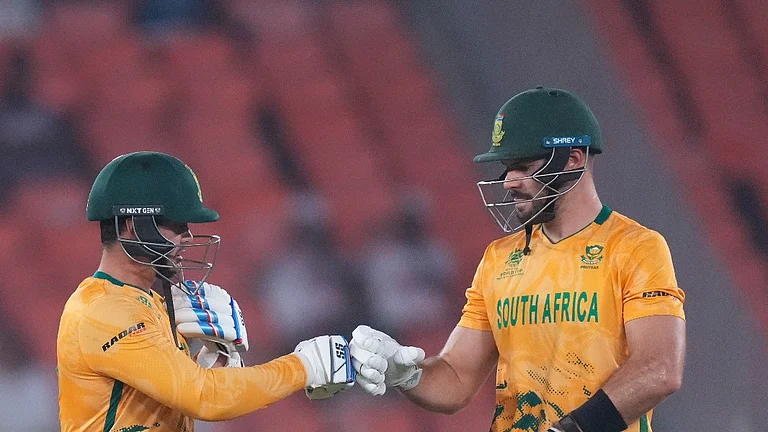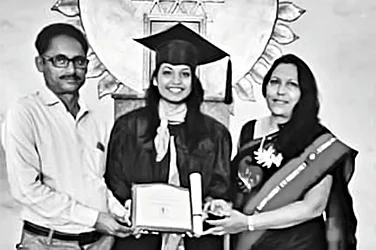The Archbishop of Delhi, Alan de Lastic, was a man who spoke his mind. Just a few days before he died in a road accident in Poland, he gave Outlook what would turn out to be his last interview. "Today I feel ashamed to be an Indian," he had said, "when I see what is happening to the Christian community I worry about India's future."
As president of the Catholic Bishops Conference of India, De Lastic led his flock at a particularly unhappy time. "There's an all-round attempt to intimidate the Christian community and hamper the work they're doing to uplift the poor, particularly in tribal areas," he said describing this as "the gravest challenge facing the community since independence".
It was the need of the times that compelled this priest to devote a great deal of time to temporal rather than spiritual concerns. The quiet soft-spoken father, who lived in a sparsely furnished room at the Archbishop's house attached to the Sacred Heart Cathedral in the heart of Delhi, was a man who could change with the times. He was internet savvy and towards the end of his life had even acquired a mobile phone. At the same time he was orthodox in some of his religious views: he was fiercely pro-life and opposed abortion.
But it was not so much as a religious leader that De Lastic came into the limelight. As the elected leader of the Catholic bishops, it was De Lastic's responsibility to speak for the community when it came under attack (of the 22 million Christians in India, 16 million are Catholics). And in the last few years De Lastic had a lot of talking to do. He would prove a natural for the job. He gave innumerable press conferences and interviews. Organised press releases. Led numerous delegations to the president and prime minister and briefed the media afterwards. De Lastic knew the importance of creating public opinion and always thanked the press for standing by him. "India has a great tradition of religious tolerance," he told Outlook, "I will never accept that Hindus are attacking Christians. It is a few fanatics who are giving India a bad name. They should realise that they end up giving their own religion a bad name in the entire world."
De Lastic also put forward a strong argument against the charge that missionaries trick people into converting to Christianity. "It is up to God to convert," he would say. "No one can convert another person. Christians are duty bound to proclaim that Jesus loves everyone and came to give us eternal life." Besides, he always insisted that conversions were not behind the recent attacks on the community. "It is a systematic campaign of poisoning people's minds through lies and hate literature that is responsible for the growing anti-Christian feelings." In spite of being deeply disappointed with the government's response to the violence, De Lastic was vehemently opposed to appealing to any foreign agency. "Why should I ask the Pope or the Vatican to speak out against the situation in India? I am an Indian citizen and would never appeal to any foreign agency. As Indian citizens we are ready to fight our own battles in India."
Of mixed European and Burmese descent, De Lastic, who was born as Alan Basil, first came to India at the age of 13. "I'm as Indian as L.K. Advani," he would joke. "Advani was born in Sindh, I was born in Burma. Both were part of greater India." After completing his schooling in Patna, De Lastic left for Calcutta, where he trained for five years to be a marine engineer. But in 1951, he decided to embrace priesthood and began his ecclesiastical studies. He was ordained a priest for the Calcutta archdiocese in 1958 and completed his doctorate in dogmatic theology from Rome. He then spent a year at the Catholic University of Dublin, Ireland.
On his return to India in the early 1960s, De Lastic first took charge of a Catholic school in the remote tiger-infested Sunderbans, then moved to Calcutta. In 1984 he was appointed Bishop of Calcutta and six years later, in 1990, became Archbishop of Delhi. But he got his clout from being elected president of the CBCI in 1998 as the body represents all the 180 bishops of India. In January this year, he was re-elected for a second term which would have continued till 2002. An orphan who was raised by his Anglo-Indian aunt and uncle, De Lastic was on his way to visit them at London, when he met his sudden death in Poland.
One of his last meetings in India had been with Prime Minister Atal Behari Vajpayee when De Lastic led a delegation representing the Christian community. It had been a fruitful meeting with the prime minister promising an investigation into the proliferation of hate literature against the Christian community. The two men had chatted easily: the archbishop had inquired about the prime minister's vacation in Manali and told him about his coming trip to Poland.
In spite of deep-rooted suspicion about RSS/BJP involvement in the attacks on Christians, De Lastic privately always spoke very highly of Vajpayee. He believed the prime minister shared his concerns but was bogged down by too many compulsions. "The prime minister is worried but his hands are tied," he told an aide. After his death, Vajpayee responded by immediately summoning the CBCI and agreed to its request for a special plane to bring De Lastic's body to India.
There is an atmosphere of mourning at the CBCI headquarters. One of his closest aides, Father Donald De Souza, describes De Lastic as a great and charismatic leader. "He was man of god whose mission was to speak of divine things. But it was the need of the hour that he speak on contemporary issues. He did that brilliantly." John Dayal, national convenor of the United Christian Forum for Human Rights, says he feels he has lost a father. "No one can fill his shoes. He was unique. Brilliant and humane at the same time."
As a man of god, De Lastic had always preached an everlasting life. And that is what he will enjoy in the hearts and minds of the community he represented with such single-minded dedication and courage.




















